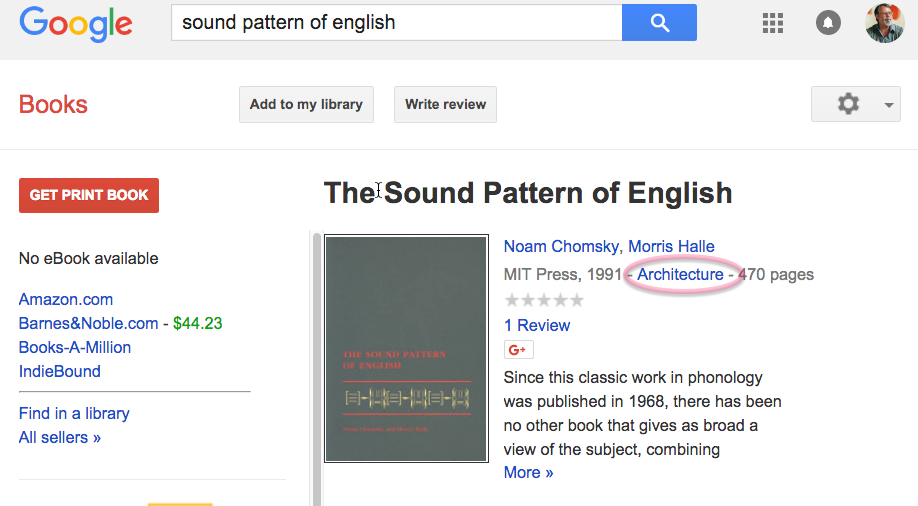Cantonese term on a traffic sign
Jeff Demarco writes:
My son snapped this photo on his way home from Hong Kong Disneyland. Wasn't quite sure what was intended…
Read the rest of this entry »
Oxford-NINJAL Corpus of Old Japanese
From Bjarke Frellesvig (University of Oxford), Stephen Wright Horn (NINJAL), and Toshinobu Ogiso (NINJAL):
We are very pleased to announce the first public release of the
Oxford-NINJAL Corpus of Old Japanese (ONCOJ). We will be grateful if you
would circulate and share this information as appropriate.
The corpus is avallable through this website: http://oncoj.ninjal.ac.jp/
Read the rest of this entry »
The architecture of speech
Or maybe it should be the sound pattern of architecture? Anyhow, Ariel Goldberg sends this interesting demonstration of the fact that Google Books still sometimes gets jiggy with its category choices:
Read the rest of this entry »
Fake degree claims dog
Garden-path headline of the day — Stephen Burgen, "Fake degree claims dog prominent Spanish politicians", The Guardian 4/10/2018. By the usual rules of U.K. headlinese, it seem that the first four words should reference a dog that somehow played a key role in some fake degree claims. But no.
Read the rest of this entry »
Folding like all the things
This quote made me do a double take: "Trump's attorney Michael Cohen will 'fold like a cheap deck of cards,' Stormy Daniels' lawyer says".
And I wasn't the only one — Peter Norvig asked on Facebook
Hey David Regal, as a professional magician, can you tell us exactly how a cheap deck of cards folds? How is that different from an expensive deck of cards? Asking for a friend.
Read the rest of this entry »
Nonfiction?
For several weeks, the "Kindle Store" panel of the Kindle app on my cell phone has been presenting Margaret Atwood's novel The Handmaid's Tale at the top of its version of the New York Time Nonfiction Bestsellers list:
Read the rest of this entry »
Multilingual tea packaging
David Langeneckert thought that I "might find this mashup of languages interesting", and indeed I do!
Read the rest of this entry »
Wolf's milk, a slime mold attractive to young Chinese?
"Growing up on wolf's milk" — when I first encountered this expression, which was applied to youth who had survived the multiple catastrophes of the first quarter-century of the PRC, I took it literally because I thought that they didn't have much of anything else to eat. Naturally, though, I did wonder how they would be able to obtain a significant amount of milk from she-wolves to make a difference.
For a moment I thought that maybe starving children were going out into the woods and scavenging for Lycogala epidendrum, commonly known as wolf's milk or groening's slime, which grows on damp, rotten logs from June through November. It wasn't long, however, before I realized that the expression "growing up on wolf's milk", as it occurred in PRC parlance from the 70s and later, was being used metaphorically to describe the hardships experienced by those who endured the privations of early communist rule in China.
Read the rest of this entry »
Linguistic divergence and convergence
In Elizabeth George's recent novel The Punishment She Deserves, there's a passage where someone uses a sociolinguistic choice to communicate her attitude towards an interaction. This reminded me of another fictional example of the same thing, and I'm sure that readers will come up with more.
Read the rest of this entry »
(Not) hardly working
From David Denison — Hard working ISA [contrasted with] not hardly working ISA:
David's comment:
This is an ad for an ISA (Individual Savings Account – tax-free for UK taxpayers), pushing the advertiser's Stocks & Shares offering against some other ISA that (presumably) merely pays interest. For me, not and hardly are alternatives before an -ing and incompatible with each other in the sense intended ('hardly at all'), though it's easy enough to find other web examples like it, as well as examples in COCA etc. where not hardly means 'hardly at all'.
Read the rest of this entry »
OED on the language of sexual and gender identity
On Twitter, Katherine Connor Martin (Head of U.S. dictionaries at Oxford University Press) writes:
In the latest @oed update, dozens of entries relating to sexual and gender identity were revised, the first phase of a project to revisit this rapidly changing segment of the English lexicon.
She links to the lengthy Release Notes, of which the following is just the introduction:
Read the rest of this entry »






